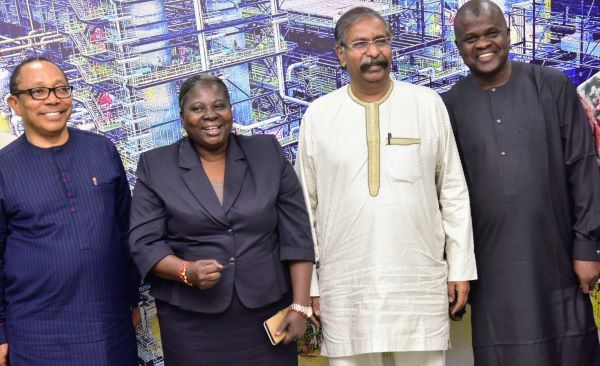The Nigerian Labour Congress (NLC) has described the Dangote Petroleum Refinery as a transformative national asset, hailing it as a vital step in bridging Nigeria’s fuel supply gap, boosting employment, and restoring confidence in the country’s industrial capacity.
Speaking during a tour of the refinery and the Dangote Fertiliser Limited plant, the Chairperson of the Lagos State Council of the NLC, Funmi Sessi, led the Council’s Executive members in commending the massive scale and strategic importance of the Dangote Group’s investments.
“Today, we have seen the massive Dangote Refinery project, as well as the fertiliser plant. We have also observed other Dangote investments in this axis. It is truly enormous and highly impressive,” she said. “What we have seen is a clear effort to bridge the gap in the availability of essential products in the country, create jobs, and industrialise Nigeria.”
Sessi noted that following the Federal Government’s removal of petrol subsidies, Nigerians experienced a sharp rise in the cost of Premium Motor Spirit (PMS). However, the entrance of the Dangote Refinery into the market helped stabilise prices.
“It wasn’t until Dangote came into the picture that we started seeing some relief. His intervention significantly crashed the escalated prices of PMS and other refined products. That’s a clear demonstration of private sector leadership,” she said.
The NLC appealed to the Federal Government to prioritise selling crude oil to the Dangote Refinery in naira, stressing that requiring the company to import crude or pay for it locally in dollars undermines efforts to reduce fuel prices for Nigerians.
“This country has crude oil in abundance. So why is Dangote still being made to import crude or pay for it in hard currency?” the union queried. “If the government is truly committed to reducing fuel prices and supporting local refining, it must sell crude oil to Dangote in naira.”
According to the union, sourcing crude in local currency would lower operational costs, making it easier to sustain reductions in pump prices.
“With a daily capacity of 650,000 barrels, this refinery can serve Nigeria and even the West African sub-region. We have also seen big ships taking fertilisers to other countries. The government must maximise this asset,” Sessi added.
The NLC also commended Alhaji Aliko Dangote for delivering a fully functional, world-class refinery capable of meeting both domestic and regional demand for petroleum products.
“When government-owned refineries failed, one man stepped up. Aliko Dangote didn’t just make promises; he fulfilled them. He has proven that Nigeria can refine its own products and meet international quality standards,” Sessi said, noting that the refinery’s production of Euro 5-compliant fuel aligns with global environmental standards and boosts Nigeria’s credibility.
In addition to fuel production, the NLC acknowledged the group’s fertiliser plant, which is already exporting to global markets, and urged the government to leverage such capabilities to enhance food security and reduce reliance on imported agricultural inputs.
Vice President of Oil and Gas at Dangote Industries Limited, Mr. Devakumar Edwin, said the company’s planned deployment of 4,000 Compressed Natural Gas (CNG)-powered trucks for nationwide fuel distribution would begin on August 15, 2025.
Edwin explained that the CNG-powered fleet would reduce logistics costs — a major factor in final pump prices — while offering a more environmentally friendly distribution model.
“The deployment of these trucks will help pass the benefits of domestic refining and lower product prices to consumers,” Edwin said. “The aim is to make distribution more efficient, not to displace existing players in the sector.”
He added that Dangote’s investments in cement, sugar, and now petroleum refining have stimulated competition and growth in Nigeria’s economy, with several local and regional players emerging in response to Dangote’s success.
The Dangote Group, he noted, also serves as a training ground for Nigerian engineers, scientists, and technicians, many of whom have gone on to work internationally. He reaffirmed the company’s commitment to human capital development, staff welfare, and Nigeria’s economic progress.


